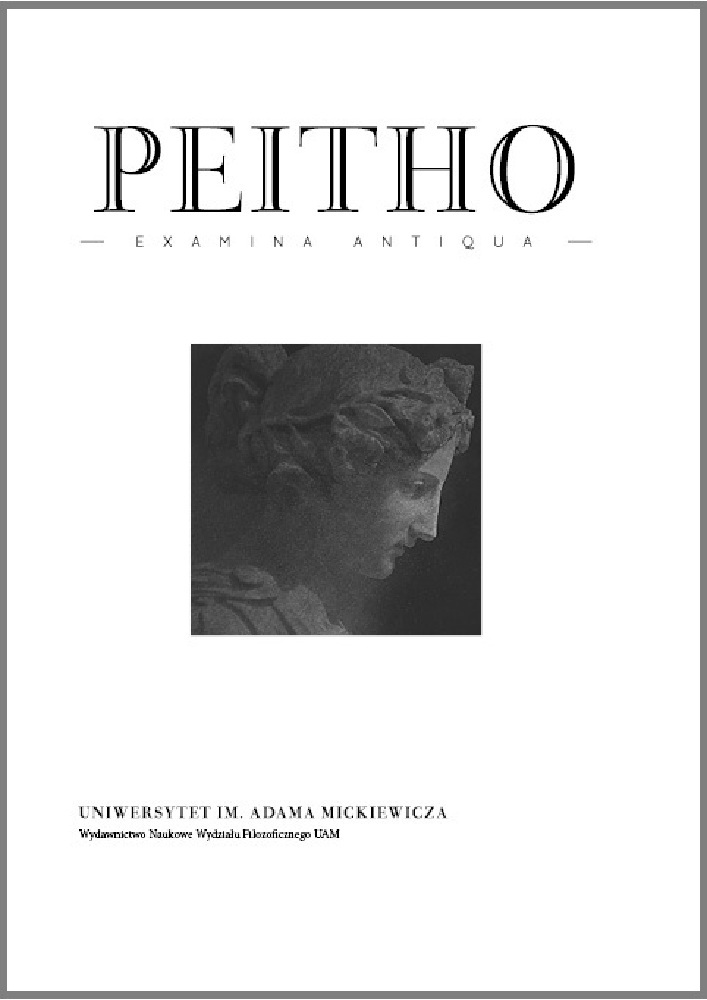Abstract
There are several recent and noteworthy studies on the testimonies and fragments of Melissos of Samos: Laks-Most (2016), Brémond (2017). Furthermore, one can learn a great deal about Melissos from the lectures and discussions undertaken in the framework of “Eleatica 2012” (Mansfeld A. et al. 2016). When taken together, these studies enable us to fully appreciate Melissos’ original work in terms of its sources, its audacious arguments and its later criticisms. Melissos is here presented as a spokesman of the Eleatic school in an order that aims to do justice to the ancient testimonies that relate and refute his arguments as well as to the verbatim fragments (these are given here in the original). For the sake of clarity, however, various secondary testimonies have been omitted.
References
REALE, G., 1970, Melisso. Testimonianze e frammenti, Firenze.
VITALI, R., 1974, Melisso di Samo sul Mondo e sull’Essere.Una interpretazione dell’Eleatismo, Urbino.
CASSIN, B., 1980, Si Parménide : Le traité anonyme De Melisso, Xénophane, Gorgia, Lille.
GEMELLI MARCIANO, M. L., 2009, Die Vorsokratiker, Bd. II, Mannheim, s. 180–220.
GRAHAM, D. W., 2010, The Texts of Early Greek Philosophy. The Complete Fragments and Selected Testimonies of the Major Presocratics. Part I, Cambridge, s. 462–485.
LAKS A., MOST, G. W. (éd.), 2016, Les débuts de la philosophie: des premiers penseurs grecs à Socrate. Paris, s. 625–557 [wersja angielska: Early Greek Philosophy, Vol. VI.2, Cambridge].
BREMOND, M., 2017, Lectures de Mélissos. Édition, Traduction et Interprétation des Témoignages sur Mélissos de Samos, Berlin.
CURD, P., 2004, The Legacy of Parmenides: Eleatic monism, and Later Presocratic thought, Las Vegas.
FURLEY, D., 1998, „Melissus of Samos”, w: K.J. Boudouris (ed.), Ionian Philosophy, Athens, s. 114–122.
GOULET, R., 2005, “Mélissos de Samos”, w: Dictionnaire des philosophes antiques, vol. 4, Paris, s. 391–393.
KLOWSKI, J., 1971, „Antwortete Leukipp Melissos oder Melissos Leukipp?”, Museum Helveticum 28, s. 65–71.
LOENEN, J. H., 1959, Parmenides, Melissus, Gorgias: A Reinterpretation of Eleatic Philosophy, Assen.
MAKIN, S., 2005, „Melissus and his opponents: the argument of DK 30 B 8”, Phronesis 50, s. 263–288.
MANSFELD, A. et al., 2016, Eleatica 2012: Melisso fra Mileto ed Elea, Massimo M. Pulpito (cur.), Sankt Augustin.
PALMER, J. A., 2009, Parmenides and Presocratic Philosophy, Oxford.
PULPITO, M.,2017, „Melisso, il tempo e l’eterno”, Peitho. Examina Antiqua 1 (8), s. 107–123
PULPITO, M., 2018, „Melisso critico di Parmenide: una rivalità mimetica” , Archai 22, s. 17–40.
RAPP, CH., 2013, „Melissos aus Samos“, w: H. Flashar, D. Bremer, G. Rechenauer (hrsgg.), Die Philosophie der Antike. Bd. 1.2, Basel, s. 573–598.
ROSSETTI, L., 2017, Un altro Parmenide, Vol. I: Il sapere peri physeos. Parmenide e l’irrazionale; Vol. II: Luna, antipodi, sessualità, logica. Bologna.
ROSSETTI, L., 2017, „Trilemmi: Il PTMO di Gorgia tra Zenone e Melisso”, Peitho. Examina antiqua 1 (8), s. 155–172.
VOLPE, E., 2017, „Melisso e il problema del vuoto: apologia e/o fraintendimento del monismo parmenideo?”, Peitho. Examina Antiqua 1 (8), s. 91–106.
WESOŁY, M., 1987, „To correct the argument of Melissus (De nat. hom. 1): an allusion to Gorgias?”, Eos 75, s. 13–19.
WESOŁY, M., 2001, „Parmenides z Elei – physikos”, Przegląd Filozoficzny 2, s. 59–85.
WESOŁY, M., 2013, „Zenon z Elei. Doksografia i fragmenty”, Symbolae Philologorum Posnaniensium 23, s. 69–96.
WESOŁY, M., 2013, „La dimostrazione propria di Gorgia”, Peitho. Examina Antiqua 1 (4), s. 159–186.
WESOŁY, M., 2020, „Traktat Gorgiasza O niebycie, czyli naturze. Świadectwa, wyciągi, polemiki”, Archiwum Historii Filozofii i Myśli Społecznej 64 (w druku).
License
Peitho provides immediate open access to its content on the principle that making research freely available to the public supports a greater global exchange of knowledge.

